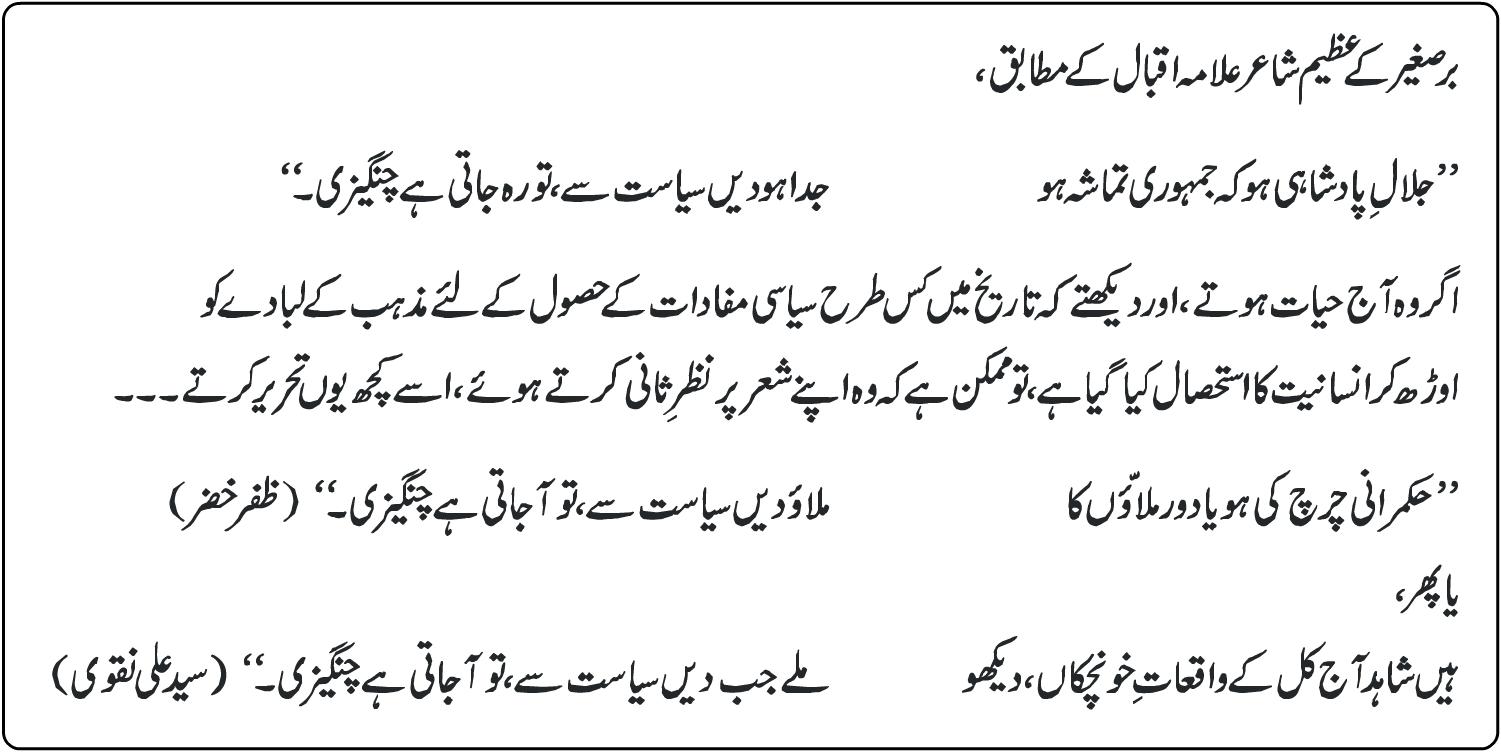- Feudalism
- Confrontation with India
- Separation of Religion and State in Pakistan
- Healthcare for All
- Education for All
- Controlling Corruption
- Energy Crises
- Population Control
- Climate Change
- Reduce Violence in Karachi
SHARE THIS PAGE
JOIN OUR MAILING LIST
DONATE $5, $10, $25, $50 or $100
Our Recommendation
Pakistan must separate religion from state and treat every citizen (man or woman, poor or rich, Muslim or non-Muslim) equal, as developed countries do. Separation of religion and state is essential for intellectual freedom, elimination of religious violence, building a nation, and for scientific and economic growth.
Explanation
Secularism does not mean being anti-religion or anti-Islam. Secularism means separation of the state from religious institutions. It also means that people of different religions and beliefs are equal before the law. Secularism ensures that religious groups don't interfere in affairs of state, and makes sure the state doesn't interfere in religious affairs.
A secular government is not under the control of a religious authority, and religious groups or individuals do not have their religious practice and beliefs, or non-beliefs, dictated by the government.
Secularism does not reject religion at the personal level. It simply takes religion out of politics to protect people from religious extremists. Only secularism can guarantee religious freedom for all.
It should be of no surprise to people that ALL developed countries, where poverty and unemployment is at the minimum level and the state is able to take care of basic needs of its citizens, provide them opportunities to prosper and can protect basic rights of people, and where all religions are practiced and can grow in a peaceful environment, are secular in practice*.
History of Separation of Religion and State in Europe
Why did Europe and other developed countries finally learn to separate religion from state? There is a history of over 1000 years of controlling the thoughts of people , violence and killing in the name of religion when religion was combined with politics or state.
First, there was the Catholic Church that burned an uncountable number of people alive at the stake if they said anything that was a threat to the Church’s power, money or beliefs. Among them included scientists such as Giordano Bruno who was burned alive at the stake (February 17, 1600) by the Church because he agreed with Polish astronomer Copernicus that the earth was in fact, not the center of the universe, but revolved around the Sun. Galileo Galilei who played a major role in the Scientific Revolution, barely saved his life by denying acceptance of Copernicus’ ideas and spent the rest of his life under house arrest. His research and work was banned for about another 100 years by the Church. Punishment of reading any book not licensed by the Church such as books of other sects and scientific books was punishable by death. All of these were done by using state power and laws.
Second, different groups of Christian religious extremists, blinded with irrational and passionate faith in their ideology, killed each other in religious wars for over one hundred years (1546-1648.) The last religious war (Catholic vs. Protestant and Protestant vs. Protestant) lasted for 30 years (1618-1648) and killed about 40% of the German population and many more in other European countries ( an estimated 3 to 11.5 million people were killed.) No group that was in power was tolerant of others. People had no choice but to adopt religion of the Ruler (King, Prince), leave the state, or be killed. This bloody history of using state power and laws to kill people who have different beliefs or ideas taught Europeans (after they became exhausted and weakened) and other countries to separate religion from state. The separation of religion from state was one of the major factors** that contributed to scientific innovation and thus economic progress by providing intellectual freedom to the people of Europe.
Footnotes:
* In England the Queen is also Head of Church of England. So one can argue that England is not a secular country but England is still secular in nature because there are no laws against a particular religion or sect.
** Other factors included abolition of feudalism and creation of inclusive democratic institutions.
References
- 1) Separation of Religion and State by Zafar Khizer
- 2) Declaration on the Elimination of All Forms of Intolerance and of Discrimination Based on Religion or Belief passed by United Nations General Assembly (November 25, 1981).
This declaration recognizes freedom of religion as a fundamental human right in accordance with several other instruments of international law (but the international community has not passed any binding legal instruments that guarantee the right to freedom of religion.) Article 1 and 4 of the Declaration are as follows:
Article 1
(1) Everyone shall have the right to freedom of thought, conscience and religion. This right shall include freedom to have a religion or whatever belief of his choice, and freedom, either individually or in community with others and in public or private, to manifest his religion or belief in worship, observance, practice and teaching.
Article 4
- (1) All States shall take effective measures to prevent and eliminate discrimination on the grounds of religion or belief in the recognition, exercise and enjoyment of human rights and fundamental freedoms in all fields of civil, economic, political, social and cultural life.
- (2) All States shall make all efforts to enact or rescind legislation where necessary to prohibit any such discrimination, and to take all appropriate measures to combat intolerance on the grounds of religion or other beliefs in this matter.
- 3) “The Wealth of Nations” by Adam Smith
Adam Smith, in his book The Wealth of Nations (published in 1776), states that in the long run it is in the best interests of society as a whole and the civil magistrate (government) in particular to allow people to freely choose their own religion as it helps prevent civil unrest and reduces intolerance. So long as there are enough different religions and/or religious sects operating freely in a society then they are all compelled to moderate their more controversial and violent teachings, so as to be more appealing to more people and so have an easier time attracting new converts. It is this free competition amongst religious sects for converts that ensures stability and tranquility in the long run.


